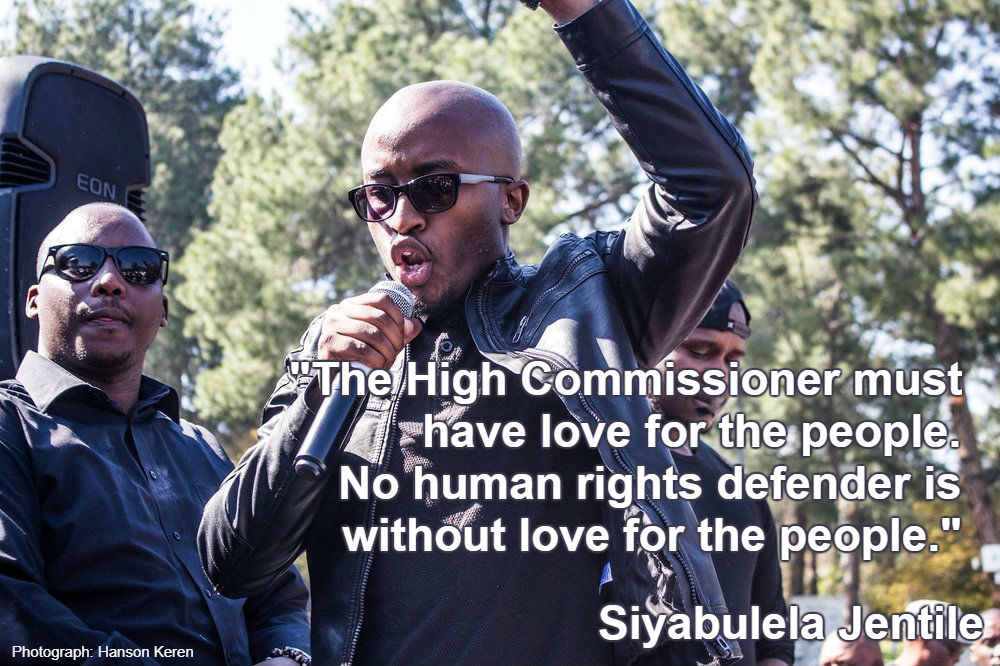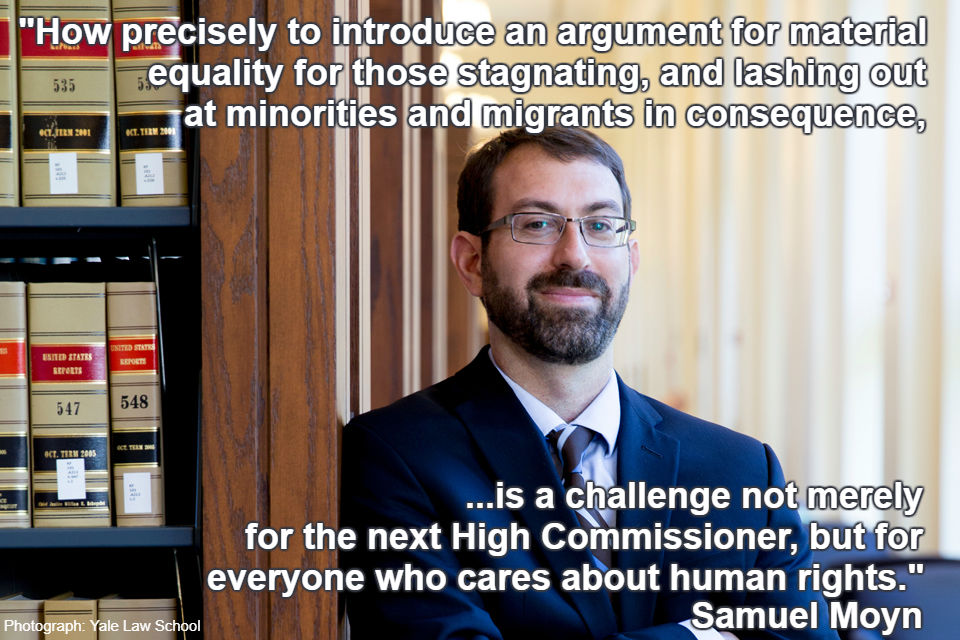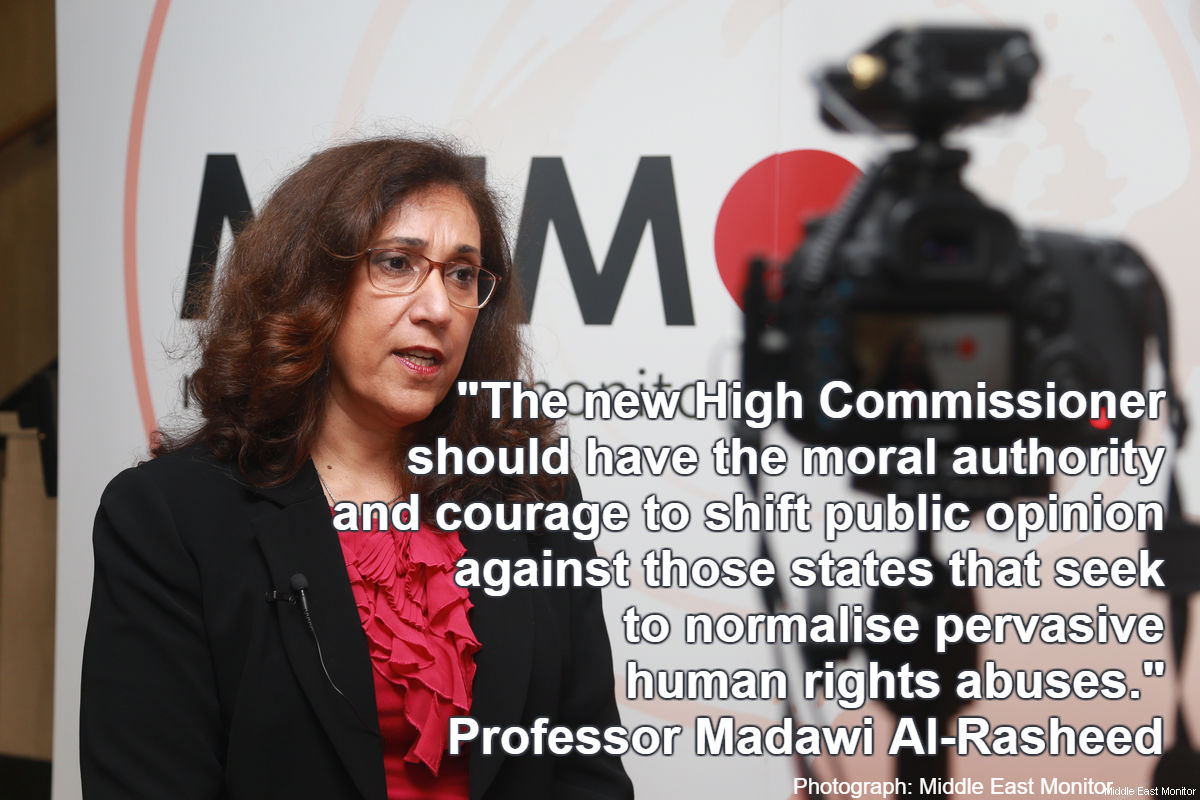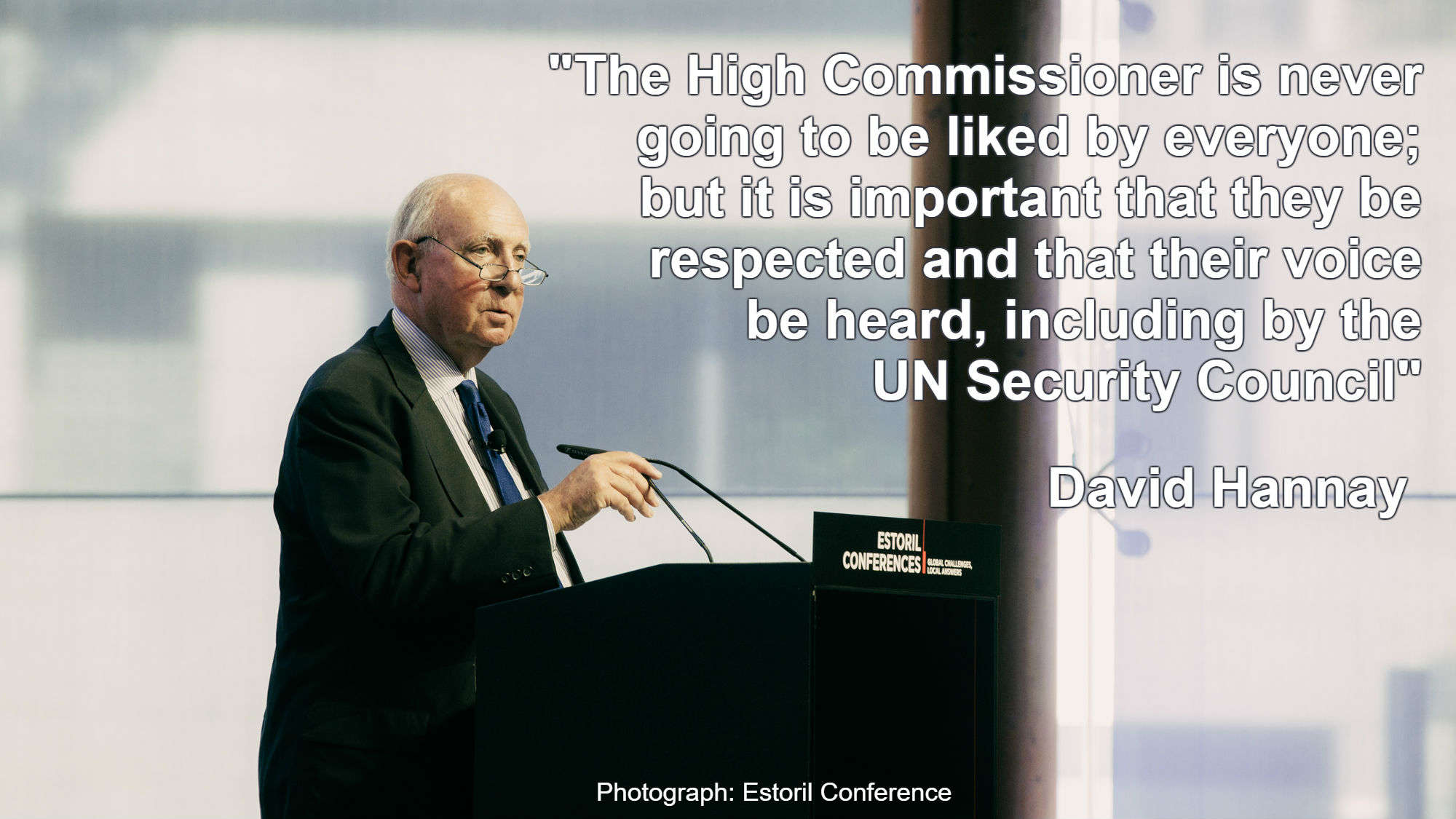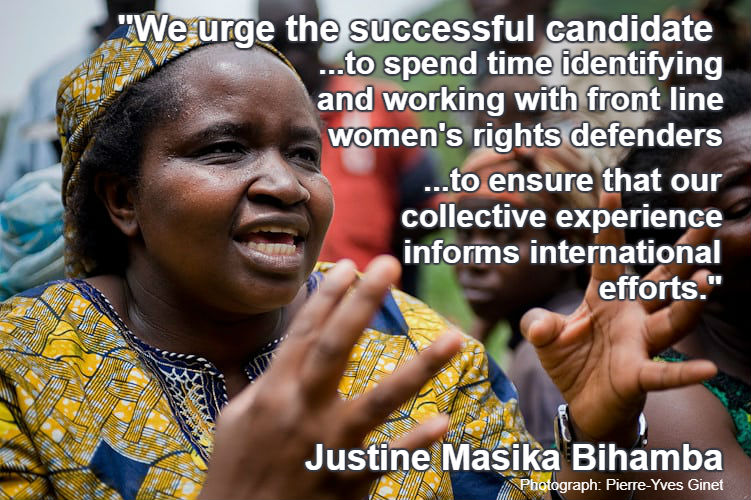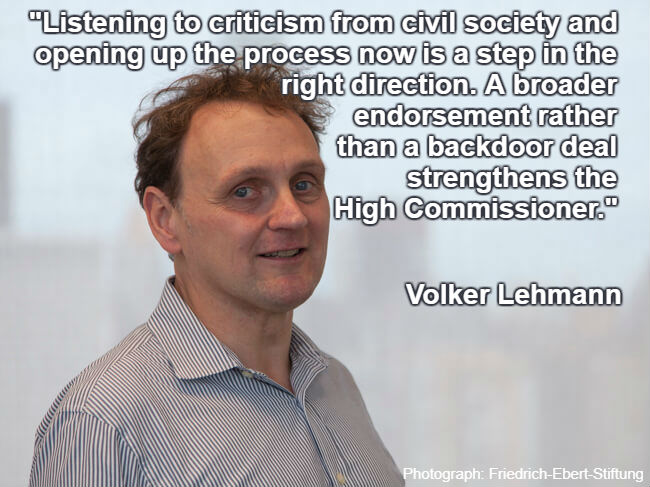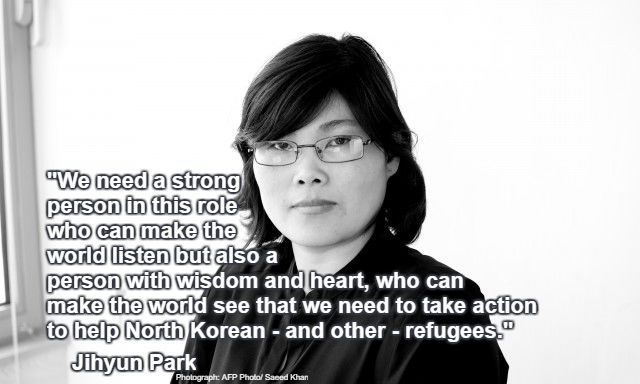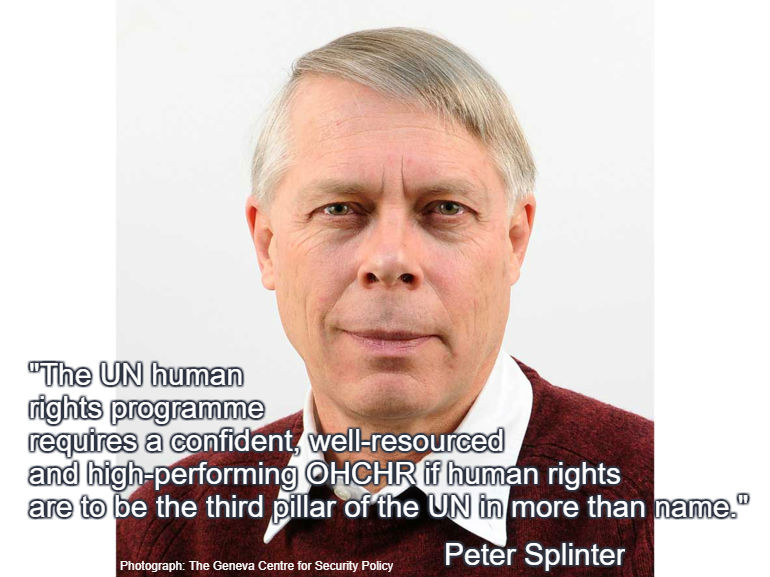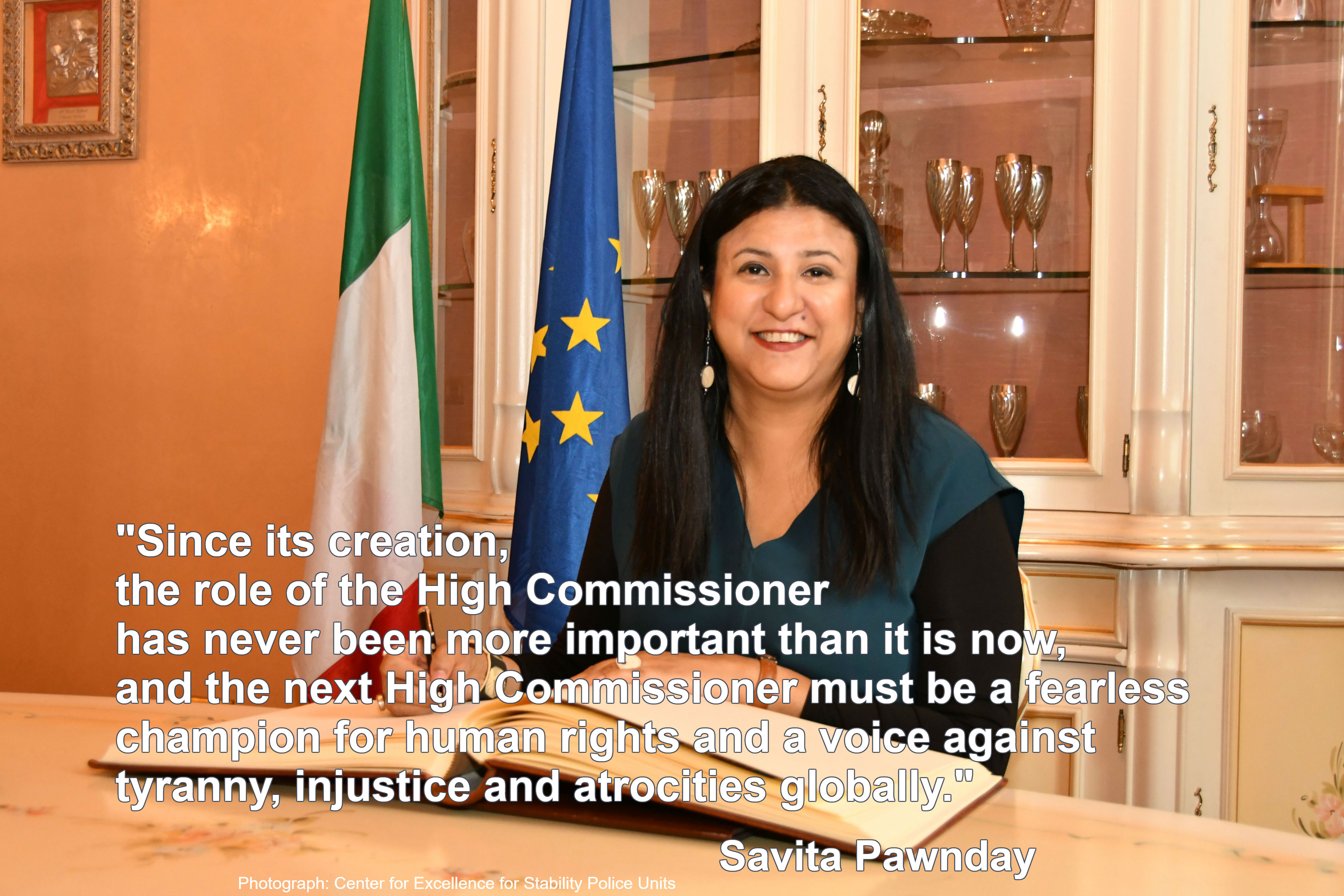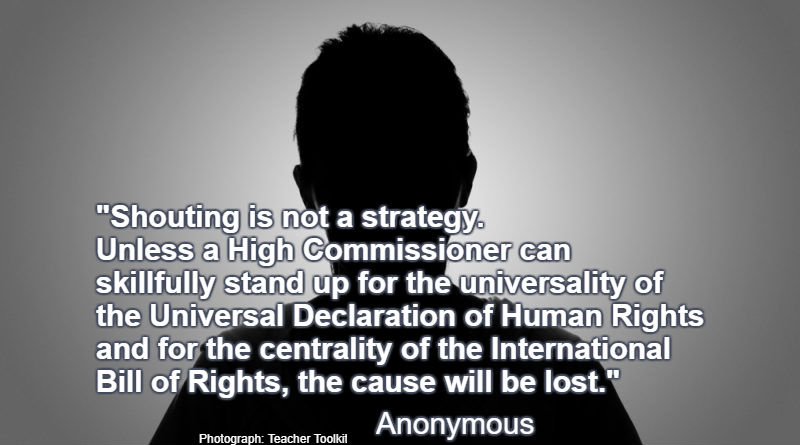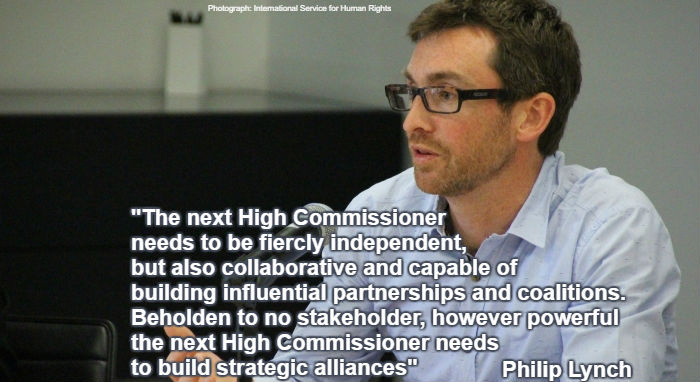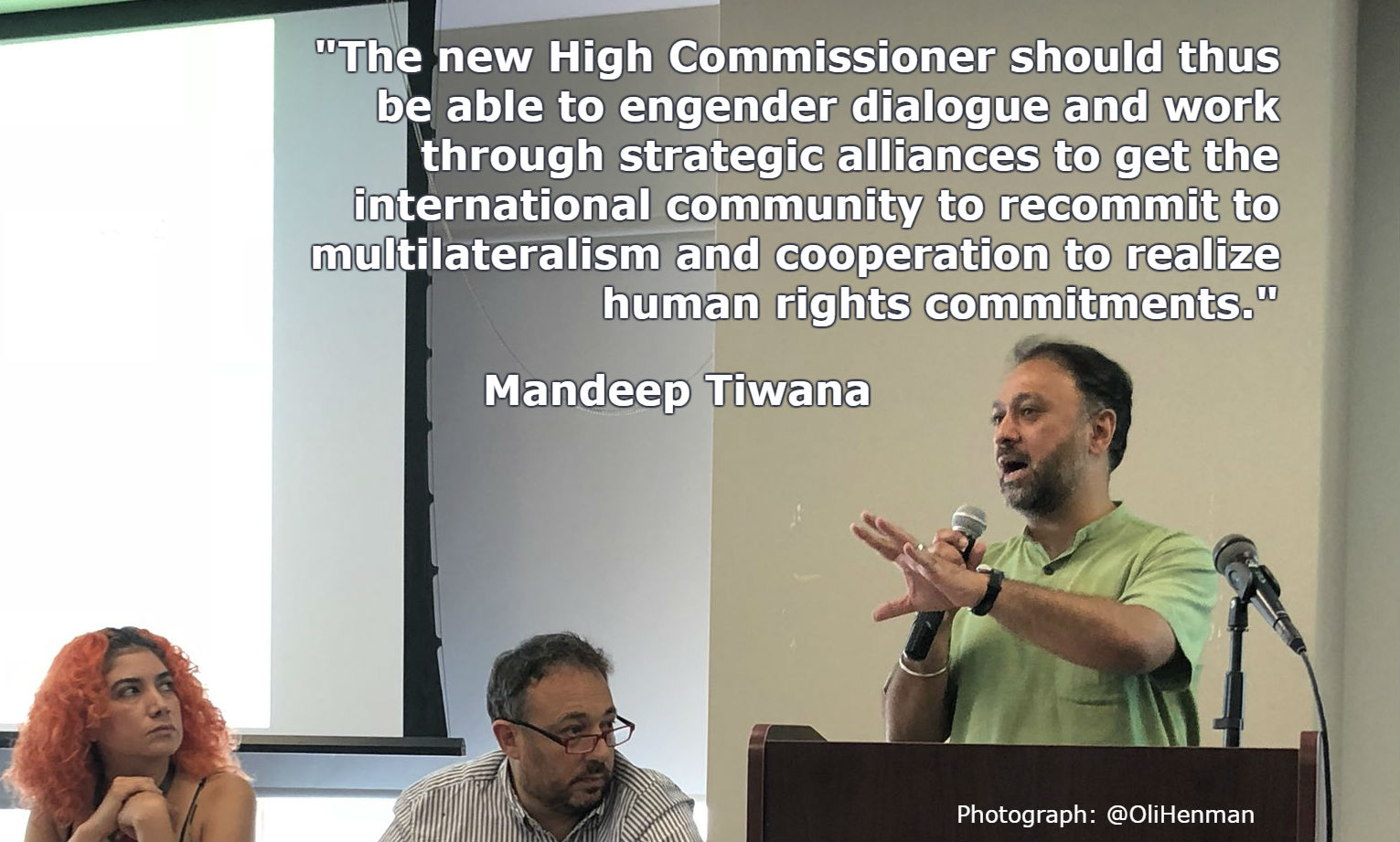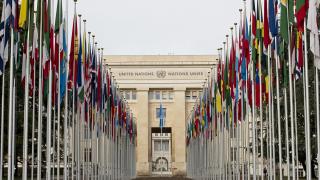
This page is part of our campaign to find the best High Commissioner for Human Rights. Back to the campaign hub.
We asked human rights defenders, activists, advocates, academics, diplomats and others from all around the world the following question:
Given the current global situation what sort of qualities do you think the next High Commissioner for Human Rights will need?”
Here is what they said, in the order submissions were received.
-
Samuel Moyn - professor of law and history, Yale University, US
-
Professor Madawi Al-Rasheed - Visiting Professor, London School of Economics, UK
-
Justine Masika Bihamba - President, Synergie des Femmes, Democratic Republic of Congo
-
Volker Lehmann - Senior Policy Analyst, Friedrich-Ebert-Stifting New York, US
-
Peter Splinter - former Amnesty International representative to the UN in Geneva, Switzerland
-
Savita Pawnday - Deputy Director, Global Center for the Responsibility to Protect, US
-
Philip Lynch - Director, International Service for Human Rights, Switzerland
-
Mandeep Tiwana - Chief Programmes Officer, CIVICUS in New York, US
Siyabulela Jentile
is a social entrepreneur, speaker and activist. He is the Founder & President of Not In My Name South Africa and Director of Siyabulela Jentile Social Development Innovations Pty Ltd.
Human rights are a pivotal aspect of our continued survival. Without moral principles in place, the world would be unlawful and chaotic.
The current global experience may be dreadful, but most countries have made progressive strides in documenting and safeguarding basic human rights. However, this cannot justify complacency. We still have a long a way to go, especially in implementing and ensuring sustainable human rights enjoyment of all people from all walks of life. It is the role of the next High Commissioner for Human Rights to lead this process and effectively steer the United Nations to help build a world where human rights of all are respected and preserved.
The most basic and important quality a High Commissioner needs, even before professional credentials can be considered, is love. The High Commissioner must have love for the people. No human rights defender is without love for the people. This will make everything else fall into perspective and enhance endurance.
The next High Commissioner must have a very resilient spirit and an uncompromising will to stand for truth, peace, justice and equality. He or she must know no skin colour and lead with integrity and fairness. Protection of human rights is a very sensitive issue. It is essentially the protection of human life itself. As such maximum discipline and focus is essential.
The role of the next High Commissioner for Human Rights is fascinating and challenging simultaneously. But with all its challenges, he or she is guaranteed the support of all of us as human rights defenders on the ground, from all over the world. We are ready to serve. With clear and concise leadership we are a step closer to the total preservation of human rights for all people around the globe.
Dr. Rouba Mhaissen
is the Founder and Director of SAWA for Development and Aid, Lebanon, a Civil Society Organisation (CSO) initially founded in December 2011 as a spontaneous response in December to the arrival of the first 40 Syrian families displaced from Syria into the North of Lebanon.
The next High Commissioner for Human Rights needs to be fearless in taking just stances on major human rights issues even if they may contradict with politicians' and diplomats' stances on human rights, as the current High Commissioner Zeid has been. She/he needs to have the skills to understand local realities, and the patience to collect facts from civil society, as well as be an internal ally to ensure those facts are transferred to the appropriate UN members, and used when needed at the Security Council. She/he needs to be an avid believer in activists and local human rights defenders, and able to intervene when their lives are threatened. In sum, she/he need to be just, fearless, active and collaborative in their approach to ensuring human rights standards are upheld.
Samuel Moyn
is a professor of law and history at Yale University and author of The Last Utopia: Human Rights in History and Not Enough: Human Rights in an Unequal World
The current High Commissioner, Zeid Ra’ad al-Hussein, cited the “appalling” atmosphere for advocacy in explaining his decision not to seek reappointment. His replacement faces a situation in which Donald Trump’s America has withdrawn from the Human Rights Council, realising fears from pragmatists that the country’s historic commitment to the whole enterprise of human rights is fragile. Reportledy Zeid was pressured within the United Nations to soft-pedal his criticism of the United States, precisely to avoid exacerbating tensions.
But in my view, the next Commissioner should proceed precisely as the current one has – offering a voice for human rights that is strong and uncompromising. At the same time, the wave of “populism” in developed countries means that the whole human rights community needs to seek a version of its agenda that is supported, sooner or later, by electoral majorities. How to do so without abridging or short-changing on human rights, or even pushing for more for migrants, is an existential challenge the High Commissioner and the rest of the human rights community will have to face.
I have argued that mainstreaming a critique of neoliberal globalization is part of the solution. And fortunately, more and more elements of the human rights community have been flirting with that step, from the special rapporteur for extreme poverty and human rights to minor and major non-governmental advocates for human rights. How precisely to introduce an argument for material equality for those stagnating, and lashing out at minorities and migrants in consequence, is a challenge not merely for the next High Commissioner, but for everyone who cares about human rights.
Professor Madawi Al-Rasheed
is a Visiting Professor at the Middle East Centre of the London School of Economics and Political Science
The office of the UN High Commissioner for Human Rights has always been important but it is even more so at a time when the full range of universal human rights are undermined in authoritarian regimes and fully-fledged democracies alike, by both state and non-state actors. Moreover, human rights NGOs are under scrutiny following recent scandals; the office needs to be beyond reproach. While the role is inevitably a balancing act between the interests of victims, states and donors, the time has come to clearly tilt that balance in favour of those who face abuse and to resist the sometimes conflicted interests of donors who threaten to withdraw their support.
The new High Commissioner should have the moral authority and courage to shift public opinion against those states that seek to normalise pervasive human rights abuses. She will need to be brave enough to speak truth to power and resist arrogant and wealthy states putting pressure on the Office to divert attention from acute abuses. She will have to go further to name and shame, rather than reward and promote, certain states that continue to violate universal human rights. The practice of engaging extreme violators has occasionally led to them having prestigious international platforms, including membership of the UN Human Rights Council, thereby ostensibly offering them recognition and legitimacy rather than moderating their excessive violations - let alone encouraging them to end the abuses. Given the global economic importance of certain states, when they are elected to the Council, they use their membership as a vehicle for charm offensives. deploying soft power among the international community to silence criticism.
While states remain by far the number one violator of human rights, non-state actors need to be equally identified. The High Commissioner will need great knowledge of why local and diverse non-state actors - for example ultra-nationalists, radical Islamists, secular radicals, misogynists and homophobes - emerge in particular contexts, and how to identify the primary causes behind their rise. She will also need to understand how certain states instrumentalise these actors and use them to intimidate populations striving for full, rather than selective, human rights.
The future High Commissioner has a difficult task at a time when human rights are undermined and marginalized. But with moral authority and knowledge, she is bound to make a difference.
David Hannay
Lord Hannay of Chiswick is a member of the House of Lords International Relations Committee. He was UK ambassador to the UN (1990-95) and served as a member of the UN Secretary-General's High-Level Panel on Threats, Challenges and Change, which proposed the creation of the Human Rights Council
The appointment of a new UN High Commissioner for Human Rights takes place at a moment when the organisation’s vital work upholding human rights is under challenge as it has not been for many years. Every member state has subscribed to the values enshrined in the Universal Declaration of 1948, but many do not honour them and many get away with impunity.
The decision by the United States to withdraw from the Human Rights Council, “deplored" in a recent report of the International Relations Committee of the House of Lords, has further damaged the capacity of the UN to uphold those rights worldwide. It will be more difficult for those who remain to press for the reforms in the Council’s activities which are sorely needed.
So it is really important that the new person appointed as High Commissioner has a strong track record in working for and speaking out on human rights issues; and is not afraid to put the weight of their office behind efforts to uphold the rights of individuals and groups, even when there is powerful resistance to those efforts. The High Commissioner is never going to be liked by everyone; but it is important that they be respected and that their voice be heard, including by the Security Council.
Three out of the five Permanent Members of the Security Council now pay scant regard to human rights issues. That imposes a heavier burden on the other two, Britain and France, to ensure that those issues are not overlooked when it comes to taking decisions on international peace and security. Let us hope they will be up to the task.
However good the High Commissioner chosen may be, they will not be able to do their job effectively if they are not well resourced. So, when a new appointment is made, it is essential that this be matched by adequate budgetary provisions.
Reforming the work of the Human Rights Council is not, strictly speaking, a task for the High Commissioner, but the two are linked umbilically. The basic problem at the Council is not, as the US alleges, an excessive concentration on Israel and the Occupied Palestinian Territories - after the killings on the Israel/Gaza border in May it is hard to argue that that does not raise massive human rights concerns - but rather a politically motivated neglect of abuses elsewhere - in Venezuela, in Myanmar and in the Democratic Republic of Congo for example. That needs to be remedied if respect for human rights is not to drop even further.
Justine Masika Bihamba
is president of Synergie des Femmes, a front line women’s rights group, which ends sexual violence in the Democratic Republic of Congo
As we know women's rights are human rights, yet historically have not been given the attention they deserve.
I hope that the next UN High Commissioner for Human Rights will build on the groundwork of predecessors in promoting the universal enjoyment of all human rights - and for women in particular.
In countries such as the Democratic Republic of Congo, women and girls face a daily struggle to enjoy their fundamental right to freedom, equality and justice. Rape has been used as a weapon of war and seemingly endless political upheaval has meant that women have faced particular hardships. There is no law protecting human rights defenders. And, although the involvement of women in peace building processes has proven to be successful on many occasions, women have been largely excluded again and again.
I would hope that the next High Commissioner would already have a clear understanding of the critical need to highlight the human rights of women and address the serious violations that continue to exist with impunity. We urge the successful candidate to be particularly conscious of difficult contexts like ours and to spend time identifying and working with frontline women's rights defenders like myself and many others around the world to ensure that our collective experience informs international efforts. We know what works best in our local context but we need international support and cooperation, much increased funding and global solidarity to be able to change our own futures from within.
By supporting locally led efforts, the High Commissioner for Human Rights will be more effective not only in dealing with existing violations but also in preventing further violations from happening to women and girls. More support for women's peace building coalitions in the Democratic Republic of Congo and in other war torn countries such as Libya and Syria can make a difference and save lives.
Volker Lehmann
is a Senior Policy Analyst for Friedrich-Ebert-Stiftung (FES) in New York
Later this year, on December 10, the United Nations will celebrate the 70th anniversary of the Universal Declaration of Human Rights. Yet human rights are under attack outside and inside the UN - be it by elected and non-elected politicians with autocratic tendencies; the decision of the United States to pull out of the Human Rights Council; or the behavior of China and Russia in the UN Security Council, not only with regards to the war in Syria, but also when it comes to undermining human rights provisions in peacekeeping mandates. The list goes on and on.
But where is the Secretary-General, representing the values and the integrity of the UN Charter? António Guterres had strong credentials as former High Commissioner for Refugees. Ever since becoming Secretary-General of the UN, Guterres has been conspicuously absent on human rights issues. Some have seen this as a calculated division of labour: remain neutral while leaving the role of the ardent critic of the US and other governments to the High Commissioner for Human Rights, Zeid Ra’ad al-Hussein. Inside the UN system, however, the Human Rights up Front initiative, started under Guterres’ predecessor, has lost steam. Moreover, the fact that the position on Special Adviser on the Responsibility to Protect has not been filled, does not bode well for the Secretary-General’s internal prioritisation of human rights.
In addition, Guterres seems to have followed previously established practice by filling high-level positions in the UN bureaucracy with nationals from the Security Council's five permanent member states, and from other powerful nations. Some expressed fear, therefore, when Zeid Ra’ad al-Hussein announced his resignation last year, that the next High Commissioner for Human Rights will be appointed not based on merit and political conviction but rather out of realpolitik calculations. Listening to criticism from civil society and opening up the process now is a step in the right direction. A broader endorsement rather than a backdoor deal strengthens the High Commissioner. Guterres should know. He profited from transparency in the Secretary-General election process himself.
Jihyun Park
is a North Korean refugee now settled in the UK
North Korean refugees sometimes feel they are a blind spot in our view of human rights, despite going through tremendous suffering.
According to the Declaration of the Rights of the Child, no matter where you are born, you are entitled to have a name and nationality. However, when children are born to a North Korean refugee woman trafficked into prostitution in China, they are deprived of these basic rights and indeed all human rights, simply because of who their mother is.
In 2014, Michael Kirby, the chair of the UN Human Rights Council's Commission of Inquiry on Human Rights in the Democratic People's Republic of Korea, said that he saw the Holocaust happening again in North Korea. But since then, nothing has changed.
Many are keeping their silence on the forced deportation of North Korean refugees and the many that are still in political prison camps. International governments stay silent on this issue while innocent people die. Our silence will kill millions more in the future.
North Korean refugees crave a fairer world with new human rights representatives. Human rights are universal - they should not be differentiated by country of birth. No one should have more entitlement to human rights than others.
That is why we need the new High Commissioner for Human Rights to highlight the plight of North Koreans at the UN. We need a strong person in this role who can make the world listen but also a person with wisdom and heart, who can make the world see that we need to take action to help North Korean - and other - refugees.
We all need to be a voice for the voiceless and give a word of hope for North Korean refugees - and a promise that we will guarantee their human rights.
Peter Splinter
is a human rights consultant and was formerly Amnesty International’s Representative to the United Nations in Geneva. Before that he was First Secretary responsible for human rights at the Permanent Mission of Canada to the United Nations in Geneva
Of the principal functions of the High Commissioner for Human Rights (HC) and the Secretary-General’s search criteria (set out in a diplomatic note of 11 June 2018), much will be made of the need for candidates to be "exceptional individuals of outstanding personal and professional qualities who will demonstrate leadership in speaking out forcefully about human rights violations wherever they occur". So much the better if such exceptional candidates can be found.
Yet it is also time to look beyond the hyper-personalisation of the post of the HC. Yes, the HC must be a leader who sets clear direction and a robust tone for UN human rights promotion and protection generally. However, at the end of the day, the HC can deliver sustainable results only with the backing of her/his Office (OHCHR) and the unwavering support of the Secretary-General.
The UN human rights programme requires a confident, well-resourced and high-performing OHCHR if human rights are to be the third pillar of the UN in more than name. A well-functioning OHCHR is essential to the effectiveness of the global promotion and protection of human rights. The next HC must have the experience and the leadership, managerial and diplomatic skills to ensure that OHCHR functions effectively as a cohesive high-performing organisation.
Moreover, the next HC cannot carry the UN’s human rights brief alone. Implementation must be taken out of the human rights ghetto and be mainstreamed across the UN. A UN-wide commitment to human rights is essential. The next HC must be able to command the support of the Secretary-General and other UN senior officials so that together the High Commissioner and her/his Office can lead the broader UN system in the promotion and protection of human rights.
Savita Pawnday
is the Deputy Executive Director of the Global Centre for the Responsibility to Protect.
Over the last ten years, the voice of High Commissioner for Human Rights on situations where populations are at risk of grave human rights abuses and atrocities has been extremely crucial to my work at the UN as an advocate for the Responsibility to Protect (R2P) and the prevention of atrocity crimes. Of particular note are the situations in Sri Lanka, Libya, Central African Republic, Syria, Democratic Republic of the Congo, South Sudan and Myanmar, where the position of the High Commissioner often served as a starting point for a discussion on possible action with Permanent Representatives of the UN Security Council.
During her tenure, former High Commissioner for Human Rights Navi Pillay made strong pleas for accountability by calling for an investigation into war crimes in Sri Lanka and asking the Human Rights Council to suspend Libya’s membership as early as February 2011 for ongoing atrocities being committed against protesters. The current High Commissioner for Human Righ Zeid Ra’ad Al Hussein was one of the first UN officials to label the situation in Myanmar’s Rakhine State as possible ethnic cleansing and genocide of the Rohingya population and has been a critical voice on the growing xenophobia, racism and nationalism around the world.
In the current global context, it is of utmost importance that the next High Commissioner for Human Rights upholds the standards set by their predecessors and fearlessly speaks truth to power. With the international human rights regime under threat, the High Commissioner must continue to speak for the most vulnerable irrespective of great power politics. The High Commissioner should not view their role as being someone who placates national and political sensitivities within multilateral forums, but instead as someone who uses their bully pulpit to highlight violations being perpetrated by state and non-state actors. Since its creation, the role of the High Commissioner has never been more important than it is now, and the next High Commissioner must be a fearless champion for human rights and a voice against tyranny, injustice and atrocities globally.
Simon Moss
is the Co-founder of Global Citizen
Personal freedoms and humans rights are under threat throughout much of the world as increasingly illiberal voices pursue policies that persecute minorities.
As Global Citizens, we must redouble our efforts to uphold the very foundation of our system of international cooperation - the UNIVERSAL - in Universal Declaration of Human Rights.
The next High Commissioner for Human Rights needs to address not just the most egregious breaches of the sort we have seen by ISIS against the Yazidis and others in Iraq, or the military against the Royhinga in Myanmar, but also the deliberate undermining of norms that we have seen across much of the world.
We need a smart political player who knows how to build coalitions in the public, media and politics to push back against this erosion, working across party lines to rebuild and strengthen a consensus for human rights that are protected for everyone.
We need someone who inspires and leads, drawing people towards a vision of what is better about our world when human rights are prioritised.
And so, to the candidates under consideration I ask, what’s your plan?
Anonymous
is a former human rights official
A High Commissioner cannot perform the job without having substantive understanding of human rights. A High Commissioner must lead, intellectually and morally, trouble-shoot when there are gross violations and engage in diplomacy to take the cause forward.
Civil society has attached importance to having a high-level political personality to activate the voice of conscience. But this can only be done on the basis of a deep understanding of the human rights norms. If the High Commissioner is not a specialist at the time of appointment, then he or she must become a student of human rights rapidly.
Shouting is not a strategy. Unless a High Commissioner can skilfully stand up for the universality of the Universal Declaration of Human Rights and for the centrality of the International Bill of Rights, the cause will be lost. The Chinese, in particular, are deftly challenging the international human rights regime.
No High Commissioner to date has had enough human rights grounding. How can the process that the Secretary-General has launched assure that the person chosen has a sufficiently deep understanding of human rights?
Philip Lynch
Phil Lynch is Director of the International Service for Human Rights. Follow him on Twitter at @PhilALynch.
The work of human rights defenders is essential to justice, fairness and dignity for all. Defenders contribute to sustainable and inclusive development. They combat corruption and the misuse of power. They promote good government, transparency and accountability. They seek to ensure that no-one gets left behind.
Despite this, around the world, human rights defenders face mounting attacks and criminalisation for standing up to power, privilege, prejudice and profit. They face worsening reprisals for providing information and evidence to human rights watchdogs, including the UN.
Their work has never been more important, nor more imperiled.
The next UN High Commissioner for Human Rights needs to be a dedicated human rights defender; a person with a deep commitment to the principles and practice of universal human rights. In addition to being a defender, the next High Commissioner also needs to be committed to working with and for human rights defenders; consulting and partnering with them, supporting their causes, and speaking out and protecting them when they are threatened or attacked.
The next High Commissioner needs to be fiercely independent, but also collaborative and capable of building influential partnerships and coalitions. Beholden to no stakeholder, however powerful, the next High Commissioner needs to build strategic alliances with states, civil society, academics and business enterprises with a shared interest in human rights and the rule of law.
With the promotion, protection and realisation of human rights being inextricably linked to the attainment of peace, security and sustainable development, the next High Commissioner needs to be strongly supported by the UN Secretary-General and key UN agencies, such as the UN Development Programme. While the High Commissioner may be the UN’s premier human rights defender, it is time for the entire organisation to put human rights defenders up front.
Mandeep Tiwana
Mandeep Tiwana is the Chief Programmes Officer at CIVICUS
As the moral voice of the United Nations and indeed the world, the new High Commissioner for Human Rights will have several important matters to contend with. We believe three in particular are worth paying attention to.
First: searing poverty amid mindboggling wealth and technological advances represents a pervasive human rights failure. Almost every decision maker of note agrees that inequality is a problem. But few have exhibited the boldness to critique market fundamentalism which is leading to privatisation of governance and shunning of state responsibilities to provide basic services to the public, and safety nets to excluded populations in particular. The new High Commissioner should have the moral courage to champion excluded voices that are often muted.
Second: democratic values are under stress in many parts of the world. Authoritarian and populist leaders are attacking civil society and democratic institutions that are essential for inclusion, rule of law and social cohesion. They are appealing to narrow notions of national identity, often disregarding the universality of human rights values. This requires a redoubling of efforts to communicate a compelling rights respecting vision to people the world over that challenges patriarchal and xenophobic discourses. The new High Commissioner should be an effective communicator who is able to speak to ‘truth to power’.
Third: multilateralism is under attack through reassertion of narrow notions of national sovereignty. This is threatening to erode decades of collective progress achieved in establishing human rights norms and supportive institutions such as the UN Human Rights Council. International peace and security, sustainable development and the environment too are at risk. The new High Commissioner should thus be able to engender dialogue and work through strategic alliances to get the international community to recommit to multilateralism and cooperation to realize human rights commitments.
Human rights defenders and civil society organisations are crucial allies of the High Commissioner but face reprisals and disenabling environments, as highlighted by the CIVICUS Monitor and the 2018 State of Civil Society Report. A High Commissioner who is familiar with the civil society landscape and is willing to work with civil society could be highly effective. Perhaps s/he could even come from civil society?
We will update the page with further responses as we receive them.

